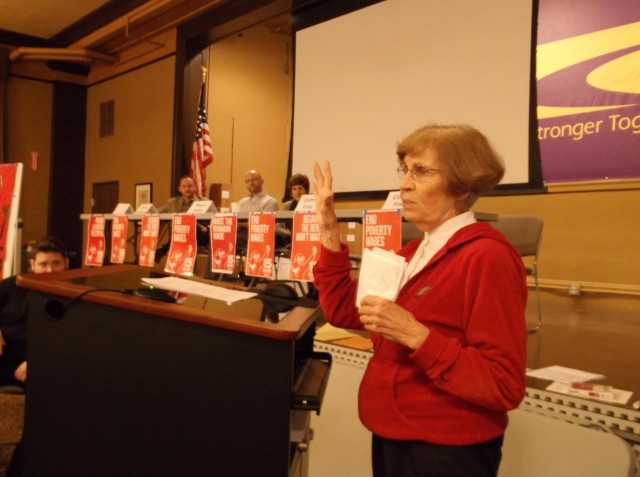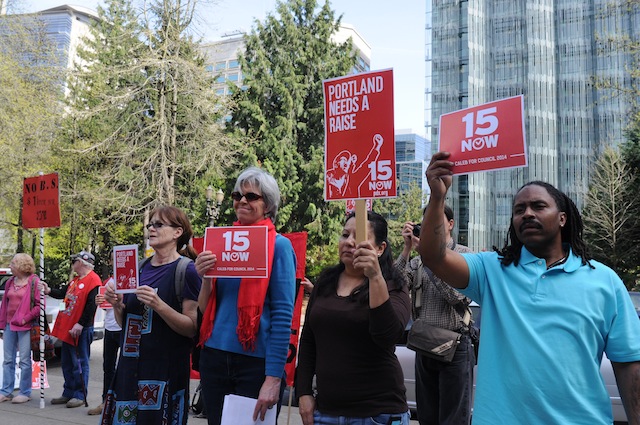Story by Pete Shaw
“I’m here, and I’m tired, and I’m speaking out with all the strength that I have. We need 15 now.”
Those words, spoken by Janice Niag, a First Student bus driver, demanding changes to the City’s Fair Wage Policy summed up the feeling at SEIU Local 49 Hall on October 20. Over 100 people attended the community meeting organized by the 15 Now Oregon campaign, which has been gathering momentum for many months in its drive to get the City to change its minimum wage for contract workers to $15 an hour.
15 Now Oregon is also pushing the Oregon legislature to raise the state minimum wage to $15 an hour and overturn the preemption clause that forbids local governments from raising the private sector minimum wage in their jurisdictions.
Niag was among a handful of people who gave anecdotal force to the litany of facts and statistics presented by Lewis and Clark College economics professor Martin Hart-Landsberg. Hart-Landsberg painted a bleak picture of the past 40 years, showing how the wealthy have gained vast control over the US political system through concerted effort that results in legislation and court decisions that continuously funnel more and more wealth upward. These changes–tax code makeovers, the diminution of people’s rights to organize, greater militarization of the economy and erroneously named free trade agreements–all contribute to an economy that “works very well for an increasingly small percentage of the population and that works very poorly for the rest of us,” Hart-Landsberg said.
Hart-Landsberg also noted that this upward wealth spiral has prevailed whether the economy was in recession or recovery. He pointed out that every economic expansion since 1980 resulted in a majority of gains to the wealthy, including the current “recovery” that has seen approximately 95% of the income gains go to the top 1 percent. “The longer the expansion goes on,” he said, “the poorer we get. While we may see the system is broken, the wealthy are content.”
With that information in hand, a series of low wage workers told their stories. Linda Sporer, who has been a security officer for 15 years, makes $27,000 a year before taxes. Despite living in a discounted apartment–the building is owned by her daughter–she struggles to make ends meet. An increase in the minimum wage to $15 an hour would give her a few extra thousand dollars and allow her some simple and currently unaffordable pleasures like taking her grandchild out for lunch
Maggie Frederick, who stated “if it’s not a living wage, it’s not a fair wage,” is a vendor at the Moda Center. She’s 82 years old and works to supplement her social security benefits. In her 20th year on the job, she makes just $11.50 an hour, up $2.25 from her starting wage.
Robbie Schaal, a seasonal worker who is assistant to the curator at the Washington Park Rose Test Garden, makes $14.18 an hour–about $20,000 a year. He “never seems to have enough” and knows that there are other seasonal workers making an even lower wage.
Tim Finn, who spends most of his work time frying chicken, has been at Fred Meyer a number of years and makes $12.50 an hour. His last raise was in February 2012, and next year he will receive another 25 cent an hour raise. Those paltry and well-spaced raises are due to Kroger (Fred Meyer’s parent company) caring more about bringing in lower wage workers rather than rewarding those with experience. Finn noted that Kroger’s CEO $8.8 million last year, a sum that would take Finn 366 years to achieve at his current wage. Living paycheck to paycheck, Finn finds it unfair that Kroger shareholders have had 3 dividend increases since 2012. “It would be better if people like me had money,” he told the audience, “because we could spend it in the community.” He then declared that if corporations are not going to be responsible enough to pay their people an adequate wage, “laws are going to have to be created to protect us.”
Niag, who makes $11 an hour driving her school bus, believes First Student “runs a sweatshop in the United States.” She talked about the many jobs she has had in the service of children–she’s been an aide in a classroom as well as a custodian–and wonders how people would react if they knew the paltry wages made by the people taking care of their children. Two of her fellow bus drivers live out of their cars and another recently told her she needed $900 by October 23 “or else me and my two children will be out on the street.”
State Representative Rob Nosse–whom 15 Now Oregon representatives say will introduce a $15 minimum wage bill in 2015–talked about the importance of raising the minimum wage here. “If the City of Portland leads on this issue,” he said, “the state will follow.” That is not as easy as it sounds. While the City of Portland can raise the minimum wage for city employees and those companies who contract with the City at any time, state law is required for public sector wage changes. While Oregon’s $9.10 an hour is one of the highest minimum wages in the country, thanks to the Oregon Restaurant Association and the politicians over which it has influence, Oregon wage law has a clause that preempts the right of local governments to raise wages.
The audience gathered in groups to discuss experiences and strategies. People were engaged, excitedly seeking out wisdom from each other. Many in the hall were part of the fight that led to Portland’s 1998 Fair Wage Policy. Numerous ideas emerged from the group discussions, including, working with faith-based organizations; packing City Council meetings; creating a State of Oregon movement; organizing, and striking if necessary; having all food service workers go on a general strike; overturning the preemption and refusing to accept less than $15 because, according to a 2014 study by the Alliance for a Just Society, a single worker with no children living in the state of Oregon needs to earn at least $15.96 per hour “to meet basic needs and maintain some ability to deal with emergencies and plan ahead.”
The discussions, combined with the testimonies, created a vibrant atmosphere. There was an energy in the room of a growing movement, one powered from below that does not rely on politicians, but rather dictates the terms to them.
The energy waned during the minutes given over to representatives from Mayor Hales’ and Councilman Saltzman’s offices. Jackie Dingfelder, speaking for Hales, said the mayor “supports sending a message to Oregon to revisit preemption.” That’s nice, and it is a line that Hales has recited numerous times. But when it comes to doing something substantial like raising the minimum wage for City workers and those workers who do City contracted work, Hales remains fairly silent.
Dingfelder also said that Hales is working with a group formed at the US Conference of Mayors that is dedicated to closing the inequality gap. Perhaps the crowd was supposed to ignore that some of Hales’ policies, such as allowing the police to confiscate the property of people without housing, were clearly not culled from an effort to close a gap that has become more pronounced during his tenure.
If Dingfelder left people scratching their heads, Brendan Finn, Dan Saltzman’s Chief of Staff, must have made them wonder if they had entered an alternate reality. By saying “pay inequality is something that’s been near and dear to my boss’ heart,” Finn seemed to want the audience to believe that Saltzman had jumped out of the pocket of the Portland Business Alliance and transformed into a modern day Tom Joad ready to stick it to The Man. At that point, it wouldn’t have been too far a stretch if Finn had set his hair on fire and started punching his head in an effort to put it out, but instead he went off on some even stranger, further-from-reality tangent about how he and policy manager Matt Grumm “work every day to house Portlanders.”
That intense work ethic no doubt explains why Saltzman effectively fined Right 2 Dream Too about $20,000 because he said the rest area for people without housing violated Oregon’s recreational camping laws. It would also explain why he up and left October 2013 council testimony that was supposed to lead to Right 2 Dream Too getting a new home beneath the Broadway Bridge, and why he tried to nix a deal between the City and Right 2 Dream Too during a February council meeting saying he didn’t want “to set up a situation where affordable housing money is bleeding over into Right 2 Dream Too.”
Well, why not? If you are going to shovel the bullshit, you might as well bring along the biggest shovel you can find.
If the audience wasn’t buying, at least it maintained a courteous composure and perhaps, in the long run, the Saltzman version of reality may prove of little consequence. Nick Caleb, who ran against Saltzman for council, garnered about 17% of the vote, despite a shoestring campaign that began just prior to the filing deadline. Caleb’s issues–including a $15 minimum wage–excited people and though he lost, his candidacy gave people a sense that, with a bit more time and resources, a true people’s candidate will emerge in Portland.
The tone of the night suggested that raising the minimum wage is a people power issue: with enough support, the politicians and their business community paymasters will be forced to change. The 15 Now Oregon movement has been endorsed by numerous labor and justice organizations. At the meeting, Dingfelder, Finn, and Grumm were presented with 5300 signatures of people who support the $15 an hour minimum wage.
Since 2012, when some New York City fast food workers decided to go out on strike to demand a better wage, the movement has spread across the country and found sympathy worldwide. In places like Seattle, SeaTac, Los Angeles, and perhaps soon San Francisco, those with power bent. They had no choice.
Economics is not hard science and what is sometimes referred to as an economic law, in the same vein as a scientific law like gravity, is not a law at all. In reality, economics is a result of political choices about how we want to run our society. Those choices currently are being made to benefit a small percentage of the population.
But they are not set in stone. We can change them. As Hart-Landsberg said, raising the minimum wage to $15 an hour is “without doubt the economically, socially, and democratic thing to do.”
Want to get involved? Go to the 15 Now PDX web page at: http://www.15nowpdx.org or visit the Facebook page at: https://www.facebook.com/15NowPDX









2 comments for “Movement to Raise Minimum Wage to $15 Keeps Growing; Activists Demand Change to State Law”